Related Research Articles

The Organisation Armée Secrète or OAS was a far-right French dissident paramilitary organisation during the Algerian War. The OAS carried out terrorist attacks, including bombings and assassinations, in an attempt to prevent Algeria's independence from French colonial rule. Its motto was L’Algérie est française et le restera.
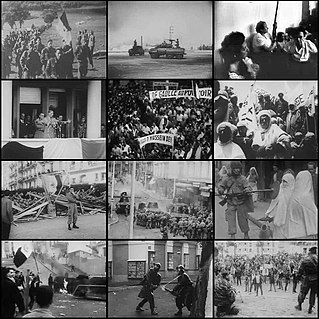
The Algerian War, also known as the Algerian Revolution or the Algerian War of Independence, and sometimes in Algeria as the War of 1 November, was fought between France and the Algerian National Liberation Front from 1954 to 1962, which led to Algeria winning its independence from France. An important decolonization war, it was a complex conflict characterized by guerrilla warfare and the use of torture. The conflict also became a civil war between the different communities and within the communities. The war took place mainly on the territory of Algeria, with repercussions in metropolitan France.

Algerian nationalism has been shaped by Algerian-French dichotomies; tensions between the French, the Berber and the Arabic language and culture; socialist as well as Islamic ideologies; and gendered symbols of nationhood—and continues to evolve in the present manifestations taking place in Algeria. It was inspired by people such as Ben Badis and Djamila Bouhired, who were two of the many opposing French colonial rule in Algeria.

The National Liberation Front is a nationalist political party in Algeria. It was the principal nationalist movement during the Algerian War and the sole legal and ruling political party of the Algerian state until other parties were legalised in 1989. The FLN was established in 1954 from a split in the Movement for the Triumph of Democratic Liberties from members of the Special Organisation paramilitary; its armed wing, the National Liberation Army, participated in the Algerian War from 1954 to 1962. After the Évian Accords of 1962, the party purged internal dissent and ruled Algeria as a one-party state. After the 1988 October Riots and the Algerian Civil War (1991–2002) against Islamist groups, the FLN was reelected to power in the 2002 Algerian legislative election, and has generally remained in power ever since, although sometimes needing to form coalitions with other parties.

Houari Boumédiène was an Algerian Nationalist, politician and army colonel who served as Chairman of the Revolutionary Council of Algeria from 19 June 1965 until 12 December 1976 and thereafter as the second President of Algeria until his death in 1978.
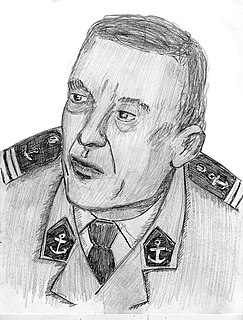
Roger Trinquier was a French Army officer during World War II, the First Indochina War and the Algerian War, serving mainly in airborne and special forces units. He was also a counter-insurgency theorist, mainly with his book Modern Warfare.
The No Fly List maintained by the United States federal government's Terrorist Screening Center (TSC) is one of several lists included in algorithmic rulesets used by government agencies and airlines to decide who to allow to board airline flights. The TSC's No Fly List is a list of people who are prohibited from boarding commercial aircraft for travel within, into, or out of the United States. This list has also been used to divert aircraft away from U.S. airspace that do not have start- or end-point destinations within the United States. The number of people on the list rises and falls according to threat and intelligence reporting. There were 16,000 names on the list in 2011, 21,000 in 2012, and 47,000 in 2013.

Jacques Émile Massu was a French general who fought in World War II, the First Indochina War, the Algerian War and the Suez crisis. He led French troops in the Battle of Algiers, first supporting and later denouncing their use of torture.

Elie Kedourie was a British historian of the Middle East. He wrote from a liberal perspective, dissenting from many points of view taken as orthodox in the field. He was employed at the London School of Economics (LSE) from 1953 to 1990, becoming Professor of Politics. Kedourie was famous for his rejection of what he called the "Chatham House version" of history, which viewed the story of the modern Middle East as one of continuous victimisation at the hands of the West, and instead castigated left-wing Western intellectuals for what he regarded as a naively romantic view of Islam.
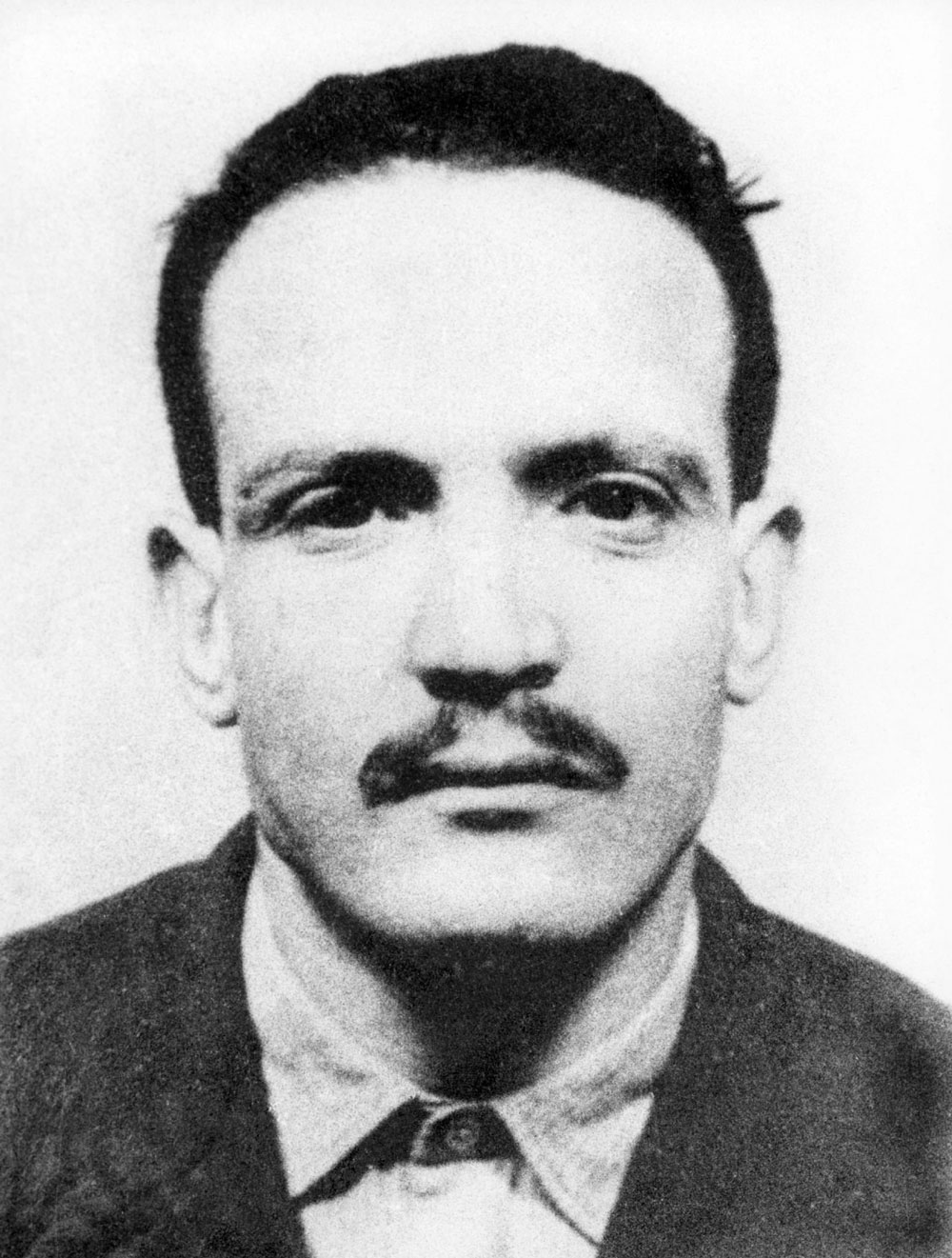
Larbi Ben M'hidi, commonly known as Si Larbi or simply as Ben M'hidi, was a prominent revolutionary leader during the Algerian war of independence. He is one of the six founding members of the Front de Libération Nationale that launched an armed revolt throughout Algeria and issued a proclamation calling for a sovereign Algerian state.

Elements of both sides in the Algerian War of Independence—the French Armed Forces and the opposing Algerian National Liberation Front (FLN)—used deliberate torture during that conflict (1954–1962), creating an ongoing public controversy. Pierre Vidal-Naquet, a French historian, estimated that there were "hundreds of thousands of instances of torture" by the French military in Algeria. The FLN engaged in the use of torture against pro-French and uncommitted members of the Algerian population in retaliation for the French's use of torture.

The Battle of Algiers is a 1966 war film co-written and directed by Gillo Pontecorvo. It is based on events undertaken by rebels during the Algerian War (1954–1962) against the French government in North Africa, the most prominent being the eponymous Battle of Algiers, the capital of Algeria. It was shot on location in a Roberto Rossellini-inspired newsreel style: in black and white with documentary-type editing to add to its sense of historical authenticity, with mostly non-professional actors who had lived through the real battle. The film's score was composed by Pontecorvo and Ennio Morricone. It is often associated with Italian neorealist cinema.
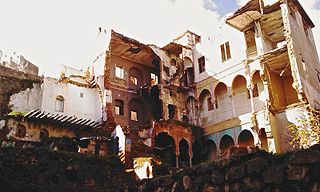
The Battle of Algiers was a campaign of urban guerrilla warfare carried out by the National Liberation Front (FLN) against the French Algerian authorities from late 1956 to late 1957. The conflict began with attacks by the FLN against the French forces followed by a terrorist attack on Algerian civilians in Algiers by a group of Pieds-Noirs, aided by the police. Reprisals followed and the violence escalated, leading the French Governor-General to deploy the French Army in Algiers to suppress the FLN. Civilian authorities gave full powers to General Jacques Massu who, operating outside legal frameworks between January and September 1957, eliminated the FLN from Algiers. The use of torture, forced disappearances and illegal executions by the French later caused controversy in France.

Unthinkable is a 2010 American thriller film directed by Gregor Jordan and starring Samuel L. Jackson, Michael Sheen and Carrie-Anne Moss. It was released direct-to-video on June 14, 2010. The film is noteworthy for the controversy it generated around its subject matter, the torture of a man who threatens to detonate three nuclear bombs in three U.S. cities.
The Battle of Philippeville, also known as the Philippeville massacre or the August Offensive was a series of raids launched on 20 August 1955 on various cities and towns of the Constantine region by FLN insurgents and armed mobs during the Algerian War between France and Algerian rebels. The raids, which mostly took the form of ethnic riots, resulted in the massacre, in extremely gruesome ways, of several dozens of European settlers known as Pieds-Noirs. These massacres were then followed by very brutal and blind reprisals by the French army and Pieds-Noirs vigilantes, which resulted in the death of several thousands native Algerians. The events of late August 1955 in the Constantinois region are considered to be a major turning point of the Algerian War.

Women fulfilled a number of different functions during the Algerian War (1954–1962), Algeria's war for independence. The majority of Muslim women who became active participants did so on the side of the National Liberation Front (FLN). The French included some women, both Muslim and French, in their war effort, but they were not as fully integrated, nor were they charged with the same breadth of tasks as their Algerian sisters. The total number of women involved in the conflict, as determined by post-war veteran registration, is numbered at 11,000, but it is possible that this number was significantly higher due to underreporting.

The 10th Parachute Division was a formation of the French Army, part of the French Airborne Units. It consisted predominantly of infantry troops, and specialized in airborne combat and air assault. Established in 1956, it fought primarily in the Suez Crisis and the Algerian War. It was dissolved immediately after the Algiers putsch of 1961.

Djamila Boupacha is a former militant from the Algerian National Liberation Front. She was arrested in 1960 for attempting to bomb a cafe in Algiers. Her confession, which was obtained by means of torture and rape, and her subsequent trial affected French public opinion about the methods used by the French army in Algeria after publicity by Simone de Beauvoir and Gisèle Halimi. Boupacha was sentenced to death on June 29, 1961, but was given amnesty under the Evian Accords and later freed on 21 April 1962.
Louisette Ighilahriz is an Algerian writer, former Conseil de la Nation member, and a former member of the Front de Libération Nationale (FLN) who came to widespread attention in 2000 with her story of captivity by the French in 1957-62, becoming, in the words of the American journalist Adam Shatz, "a catalyst of a debate about the legacy of the French-Algerian war".
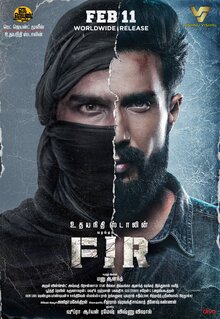
FIR: Faizal Ibrahim Raiz is a 2022 Indian Tamil-language action thriller film written and directed by Manu Anand and produced by Vishnu Vishal, Shubhra and Aryan Ramesh under the banner of VV Studioz. The film features Vishnu Vishal, Gautham Vasudev Menon, Manjima Mohan, Reba Monica John, Raiza Wilson in lead roles, and Gaurav Narayanan and Prashanth Rangaswamy in supporting roles. The film's music is composed by Ashwath, with editing by Prasanna GK.